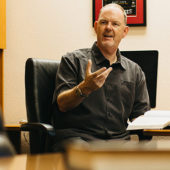He was a man employed by a boss whose wife decided to make a play for him sexually. The man refused. This only angered the wife, so much so that she went to her husband with a false accusation. Spurred on by the rejection, she told her husband that the employee tried to come on to her sexually. The employer believed his wife. Why would she make something like this up? The employee was charged with a crime and sent to jail.
Sounds like a modern day news story that could happen anywhere, right? It’s actually the story of biblical Joseph and his run in with Potiphar’s wife. Joseph, and many other Bible figures know what it is like to be falsely accused.
False accusations happen to most of us at some point in our lives. And like Joseph, you may not have the power to correct the lies because accusers hide behind the wall of anonymity on social media or simply don’t want to hear the truth. They believe the lies of other people.
How should I respond?
The natural impulse is to get angry and push back. Sometimes that natural response can have serious consequences, especially if the accuser is someone in power over you.
Of course, the right thing to do is to go to the person who has accused you and try to reconcile if that is possible. But reconciliation takes two and the other person has to be willing to listen and take responsibility for his or her part–the accusation. In real life, this doesn’t usually happen because accusers are usually people of great insecurity who lack trust and honest conversation. Accusations fly when someone feels threatened and doesn’t have the conflict skills to go to the person and check things out before coming to a conclusion.
The psalmist, David, provides wisdom for this issue in Psalms 3-5. He begins by stating that there are many who rise up against him. But his response is to remember that the Lord is a shield for him. The Lord hears David’s cries for help and listens. Here are the three steps to responding to false accusations.
1. Cry out to the Lord. He hears you in your distress. You are not alone and He is aware of what is happening. The Lord will hear when I call on Him -Psalm 4:3
2. “Be angry and do not sin” is the directive. Anger is acknowledged as a real emotion that rises up when we are falsely accused, but the challenge is to feel that anger and not sin in response to it. This often takes great control only possible through the Holy Spirit in you. In the morning I will direct it to you-Psalm 5:3
3. Meditate; be still and put your trust in God. Sit quietly before the Lord and allow Him to direct your thoughts and actions. Ask for wisdom in terms of what to do. Meditate with your heart on your bed and be still–Psalm 4:4
God assures us that if our attitude is right, He will protect us if we put our trust in Him. He is our security! And in Psalm 5, David reminds us that he will destroy those who speak falsehoods (verse 6).
In our culture of accusation, offense and falsehoods, remember the right response of faith. Your shield, protector is not man, but God.





















